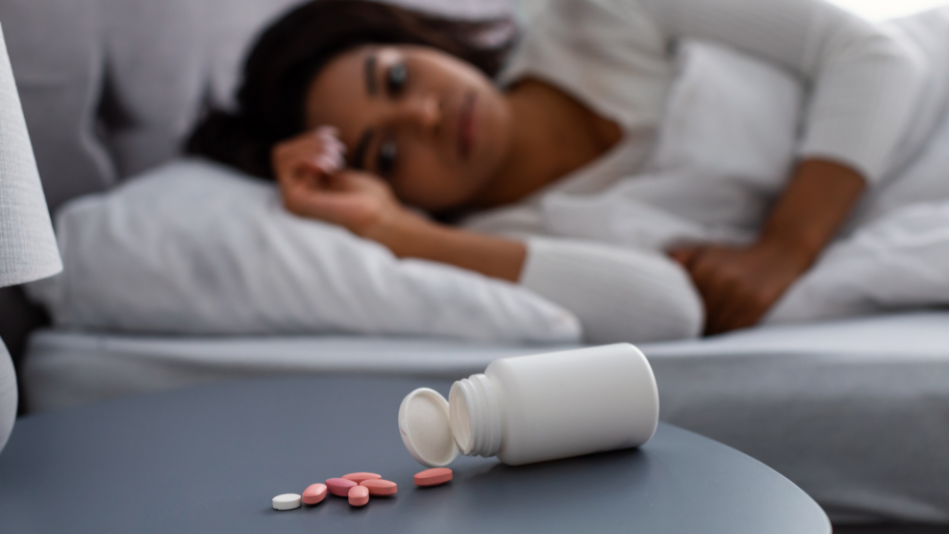Here's What Happened When We Quit Sleeping Pills
A sleep-deprived, Lunesta-loving Leigh Haber looks for a few fresh ways to make it through the night.

Photo: Prostock-Studio/Getty Images
En route to a resort in Costa Rica five years ago, the van I was traveling in got robbed. My passport, credit cards, cash and fearless optimism—all taken. But the loss that shook me—the thing I grimly drove four hours on a twisty, two-lane highway to replace—was my Lunesta.
Disturbing as it was to face the extent of my little (or not so little?) problem, it didn't change anything. I needed sleep, and if that meant pills, so be it. But the memory never left me. Recently, a well-meaning friend told me about an app featuring "binaural beats," computer-generated sound files that play different tones in each ear, somehow coaxing your brain waves into moving more quickly into sleep. It sounded like something from The Jetsons. I explained the universe of difference between a "light sleeper" and a true insomniac, the years I lay wide awake before succumbing to the prescription pad. I was way beyond beats. But, against all reason, I agreed to try it—maybe I was just too fatigued to put up a fight. For six nights, I faced bedtime sans pill, earbuds in, serenaded by what sounded like a cross between howler monkeys and house music.
I barely slept that week. But, surprisingly, the world didn't come to an end, which led to a strange thought: Could I find an alternative to pills?
A doctor friend had told me that doses of vitamin D were helping some of his sleep-challenged patients. I bought several jars. Another insomniac had read that when you wake in the middle of the night, you can fall back to sleep by thinking your way into the dream you were having. Weird, but worth a try. Chamomile tea was once part of my nightly ritual. Couldn't hurt. And—don't judge—I found that humming Joni Mitchell's "Both Sides Now" was a tranquilizer. I read up on cognitive-behavioral therapy for insomnia and was surprised to learn that many people wake a couple of times in the night—it's normal. Maybe I could try not panicking next time my eyes pop open at 3 A.M....Joni Mitchell.
It's been a few weeks. I'm tired, so tired, of viewing sleep as a battle. But I've looked at sleep from both sides now—the pharmacologically aided and the drug-free. And while a pill is easy, might I be missing something by fading right to black every night?
I still have that prescription bottle in my nightstand. But increasingly, it remains closed.
Disturbing as it was to face the extent of my little (or not so little?) problem, it didn't change anything. I needed sleep, and if that meant pills, so be it. But the memory never left me. Recently, a well-meaning friend told me about an app featuring "binaural beats," computer-generated sound files that play different tones in each ear, somehow coaxing your brain waves into moving more quickly into sleep. It sounded like something from The Jetsons. I explained the universe of difference between a "light sleeper" and a true insomniac, the years I lay wide awake before succumbing to the prescription pad. I was way beyond beats. But, against all reason, I agreed to try it—maybe I was just too fatigued to put up a fight. For six nights, I faced bedtime sans pill, earbuds in, serenaded by what sounded like a cross between howler monkeys and house music.
I barely slept that week. But, surprisingly, the world didn't come to an end, which led to a strange thought: Could I find an alternative to pills?
A doctor friend had told me that doses of vitamin D were helping some of his sleep-challenged patients. I bought several jars. Another insomniac had read that when you wake in the middle of the night, you can fall back to sleep by thinking your way into the dream you were having. Weird, but worth a try. Chamomile tea was once part of my nightly ritual. Couldn't hurt. And—don't judge—I found that humming Joni Mitchell's "Both Sides Now" was a tranquilizer. I read up on cognitive-behavioral therapy for insomnia and was surprised to learn that many people wake a couple of times in the night—it's normal. Maybe I could try not panicking next time my eyes pop open at 3 A.M....Joni Mitchell.
It's been a few weeks. I'm tired, so tired, of viewing sleep as a battle. But I've looked at sleep from both sides now—the pharmacologically aided and the drug-free. And while a pill is easy, might I be missing something by fading right to black every night?
I still have that prescription bottle in my nightstand. But increasingly, it remains closed.



